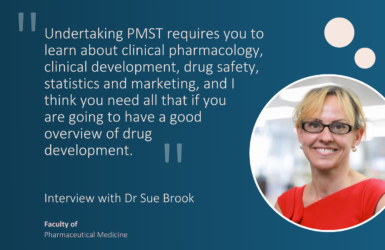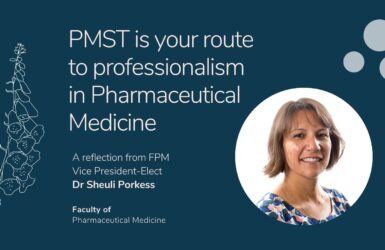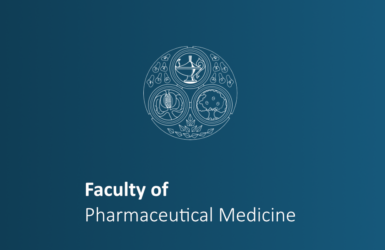Interview with Dr Fazil Afzal
Posted on: Monday 14 November 2022
Author: Konrad Obiora
Our short series of interviews to mark the twentieth year of pharmaceutical medicine as a recognised UK medical specialty continues with Dr Fazil Afzal.
The views and opinions expressed in this article are those of the people involved and do not represent the views of the MHRA, any company, nor, necessarily, represent those of FPM.
Dr Fazil Afzal has worked in pharmaceutical medicine for eight years, starting with his first role in the specialty as a study physician. Fazil works for the Medicines and Healthcare products Regulatory Agency (MHRA) as a medical assessor; he is also in his final year of the Pharmaceutical Medicine Specialty Training (PMST) programme.

KO: Why did you decide to move from clinical practice to pharmaceutical medicine?
AF: Two key reasons drove my decision to pursue pharmaceutical medicine. First, I wanted to continue to make a difference to patients and public health but on a scale different to the frontline clinical medicine I had practiced at the time. Second, in comparison to the other clinical specialties I considered applying to, I believed a career in pharmaceutical medicine would best place me to facilitate the development of innovative treatments for patients.
How did you prepare for your first role in pharmaceutical medicine?
Prior to my first role in pharmaceutical medicine, I was enrolled in the Core Medical Training [CMT] programme. During that training period I researched my options for which specialty I wished to pursue further training in. From resources such as the ST3 recruitment website I discovered the option of pharmaceutical medicine which garnered my interest. I then conducted further research by exploring the resources on the Faculty of Pharmaceutical Medicine’s website, speaking to a physician already in the industry and then networking with recruitment firms that specialised in pharmaceutical physician roles. After completing CMT, I got my first role as a clinical research physician in a contract research organisation. To prepare for that role specifically, I completed background reading around key clinical trial legislation and Good Clinical Practice.
Were there any challenges or differences when you moved into your first role in pharmaceutical medicine?
The background reading and preparation I carried out before starting my new role were very helpful in helping me adjust to my first role as a clinical research physician. In practice, a key difference I noted was the need to provide clinical oversight to healthy volunteers in clinical trials in comparison to the unwell patients I had previously managed in the NHS. In addition, moving from the NHS to a private research setting gave me the opportunity to understand non-clinical factors such as cost, logistics and study efficiency that impacted the needs and performance of the business.
What is your current role?
My current role is a medical assessor working in the MHRA [Medicines and Healthcare Products Agency]. The MHRA is the UK regulator for medicines, medical devices and blood components for transfusion. I specifically work in the pharmacovigilance division of the MHRA. Other medical assessor roles are based in the licensing and inspectorate divisions of the MHRA.
What work does your role cover – what is a typical day for you?
No two days are the same and there is a wide range of activity and depth of work. Examples include reviewing potential and confirmed drug and device safety issues, presenting at UK expert committees, processing post-authorisation safety variations to product licenses, preparing a wide range of communications, addressing queries from internal and external stakeholders and collaborating with colleagues from other regulatory agencies. The MHRA also supports continued professional development through a variety of internal and external training and teaching opportunities.
How did the COVID-19 pandemic impact your role and your work?
The pandemic stimulated an increase in workload and activity across the agency. It also raised the profile and public awareness of the MHRA and the work we do. With respect to my own role, I noted an increase in work relating to the medicines I looked after. I also took the opportunity to contribute to the work of the agency teams assessing the initial authorisation and post-marketing monitoring of the COVID-19 vaccines and therapeutics.
What do you enjoy about working in pharmaceutical medicine?
I particularly enjoy the variety of work and the challenge of addressing important issues. Whether you work in clinical trials, as the regulator, medical or regulatory affairs in the pharmaceutical industry, there is a lot of scope to pursue your interests.
What advice would you give to doctors thinking about a career in pharmaceutical medicine?
This is a career path that is intellectually stimulating and can offer a good work-life balance. There are opportunities to enter this field from a variety of clinical backgrounds and stages of training. The
scope and variety of work in different areas of the specialty means you have many options to develop as a pharmaceutical physician. In addition, you can develop and apply management and leadership skills as well as business acumen.
If you’re interested in this career then I would strongly advise reading relevant online resources such as the Faculty of Pharmaceutical Medicine’s careers guide and speaking to physicians already in industry who can offer further insight and advice.
Why did you decide to undertake PMST?
Prior to joining PMST I was already developing my knowledge of pharmaceutical medicine through my daily work, my enrolment on a part time MSc in clinical pharmacology and a successful sitting of the Diploma of Pharmaceutical Medicine [DPM] exam. Following these activities, I wanted to reinforce my professional development and demonstrate my commitment to upholding the high ethical and professional standards expected of a pharmaceutical physician. I therefore consulted with the PMST educational supervisor at the MHRA and discussed joining the four-year PMST programme. My previous four years of clinical training, work for my MSc and my successful sitting of the DPM were recognised and I was able to enrol onto PMST successfully. As a trainee I have valued the scope and structured nature of the training alongside the flexibility to the role and work I perform.
This year marks the twentieth year that pharmaceutical medicine has been a recognised medical specialty in the UK. Where do you think pharmaceutical medicine will be in another 20 years’ time?
Twenty years is a long time in a fast-evolving field and things can significantly change but what must stay the same is patient-centered care, which is at the heart of everything we do. I think there will be an increase in the development and integration of personalised medicine, empowered by increasing data collection and facilitated through advances in genomic knowledge, artificial intelligence and the use of drug-device combinations. Change will also be dependent on healthcare priorities, healthcare budgets and research innovation. As an example, the COVID-19 pandemic represents an important opportunity to apply the lessons learnt from the pandemic response and the role of pharmaceutical medicine in mitigating the risks of a future pandemic.



